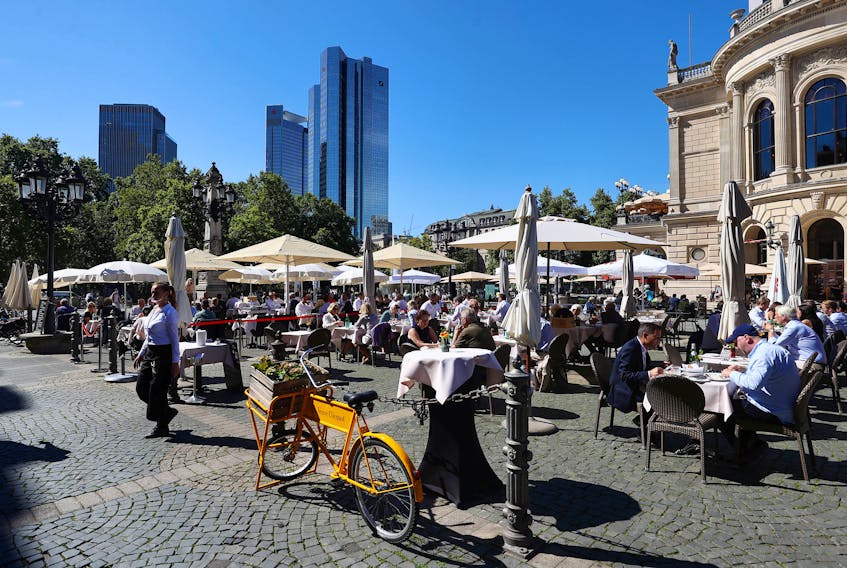I have just spent two weeks driving around Germany interviewing people (mostly climate scientists, since you ask), and I have come to the conclusion that it is the best-run — and quite possibly just the best — major country in the world right now.
Some small countries are absolute jewels, of course, but it’s easier if you’re small. Big powers fight more wars, contain more divisions, suffer nastier and more ridiculous delusions of grandeur. But if you only consider countries with more than 50 million people, then Germany today is the fairest, the least conflicted, the most peaceful, actually the nicest major country on the planet.
That wasn’t true 30 years ago, and it may not be true 30 years hence, but it’s worth noting because today (Oct. 3) marks the 30th anniversary of the unification of Germany in 1990, just one year after the Berlin Wall came down. Compared to what happened after the first time it was unified, it has all worked out rather well.
There are sad people and even wicked people in Germany, like everywhere else, but as a society it radiates contentment.
The first unification of Germany, in 1871, was achieved by war, and led to more and much bigger wars — not entirely Germany’s fault, of course, but certainly the consequence of the sudden appearance of a highly nationalistic new great power in the heart of Europe.
After the Second World War, Germany was divided into three. The eastern third was emptied of Germans and given to Poland (in compensation for the eastern third of pre-war Poland, which was kept by the Soviet Union). The middle part, also under Soviet occupation, became Communist-ruled “East Germany,” while the rest, with most of the population, became “West Germany.”
The “two Germanies” became the cockpit of the Cold War, with huge armies of tanks ready to roll and nuclear weapons not far behind them. Many people understood that this could not go on forever, that some day the country would have to be reunited — but they were terrified by the prospect. They feared that the process of reunification might trigger a war, and they also feared a reunited Germany.
Hastings Lionel Ismay — Lord Ismay — the British general who became the first secretary-general of the NATO alliance (which included West Germany), put it bluntly: “NATO exists to keep the Russians out, the Americans in, and the Germans down.” French journalist and poet François Mauriac said it more elegantly: “I love Germany so much that I’m glad there are two of them.”
If the trigger to end the East German Communist regime had been in British, French and American hands, it might never have been pulled. But it was actually in the hands of the East Germans themselves, and in 1989 they brought down their oppressors without a shot being fired. All the other Communist states of eastern Europe followed suit.
There was great joy in both parts of Germany — the street party after the Berlin Wall came down was probably the best and certainly the longest I have ever attended — but there was considerable trepidation elsewhere. However, Mikhail Gorbachev, the reformist Soviet leader, reassured everybody by declaring that Moscow had no objection to German reunification, and the deed was done 30 years ago this week.
It has worked out very well. There are sad people and even wicked people in Germany, like everywhere else, but as a society it radiates contentment. Unflustered competence lubricated by a general tone of goodwill makes minor daily transactions less of an ordeal, and the strident nationalism that now disfigures so many other countries is conspicuous by its absence.
In place of that the Germans have a dedication to the European project: like “Amens” in a church, invocations of “Europe” punctuate political conversations. And if you say this is a defensive reaction against Germany’s terrible history in the two generations before 1945, I would probably agree — but what’s wrong with that?
Even the economic contrast between the formerly Communist-ruled east and the rest of the country, to the great disadvantage of the former, is gradually eroding. Average incomes among “Ossis” (easterners) are now up to almost 90 per cent of “Wessi” earnings. All the “coolest” cities, the magnets that attract the young, are in the former east: Berlin, Dresden and now Leipzig.
It’s not paradise, but when you compare it with the incompetent, belligerent populism that prevails in formally democratic countries like the United States, the United Kingdom, Brazil and India, it looks pretty good. “Wir schaffen das” (We can manage this), said Chancellor Angela Merkel when over a million mostly Muslim refugees arrived in Germany in 2016, and four years later it looks like she was right.
“Mutti” (Mommy), as Germans call her, has been chancellor for half of the past 30 years, so there will be a collective holding of breath when she retires next year. But the world would be a better and safer place if there were more countries like Germany.
Plus, there’s no speed limit at all on the autobahns. Where else can you drive at 160 kilometres per hour and have cars whooshing past you all the time?
Gwynne Dyer’s new book is “Growing Pains: The Future of Democracy (and Work).”









